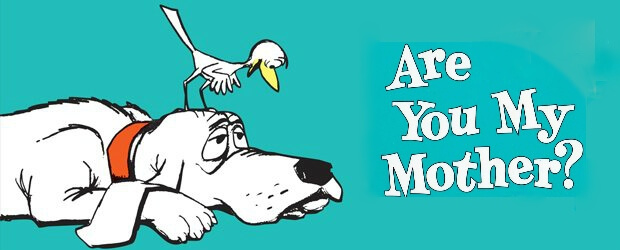When I was little, I’d snuggle up to my mom in the evenings and listen to her reading “Are You My Mother?” to me, attracted to the melancholy plight of the children’s book character in a way I’d never been to Snow White or Babar. In the story, the baby bird, a rather pathetic figure with giant, hopeful eyes, wanders from cat to tractor to cow and car, repeating his increasingly urgent question: “Are you my mother?” I felt the pain that brought cartoon tears to his cartoon eyes and tremors of defeat to his feathered chest.
The sensation of lostness was all too familiar to me, even at that age.
When I saw a copy of the book in a store a few weeks ago, my instant reaction was an urge to reach through the glossy cover and comfort the hapless hero. I saw a bit of me in him—a lifetime spent wondering if new places and people groups would be my “mother,” my place of belonging and sameness.
In many respects, MKs are not much different from this forlorn feathered fellow. We hover between clusters of those who know their place and fit their social contexts, hoping that someone will want us or include us despite our difference. We try to be tough and endure it. We try to act like it doesn’t really matter. But we still live our lives in a more or less conscious pursuit of belonging.
“I will never belong” is a sentiment I’ve heard expressed with various degrees of rancor and drama in my twnty years in MK education. Of all the traits Third Culture Kids and MKs share, I think this one is among the most powerful.
It is born of multi-cultural, multi-national, multi-experiential backgrounds that serve both to expand our worlds and limit our full adaptation to any of them.
One of my first conscious thoughts about my TCK identity came at a young age, when I realized while on furlough that I’d never be fully American, and that the French would never consider me fully French, either. Weird in America. Weird in France. Is it any wonder that places like Black Forest Academy become such a haven of “sameness” to MKs? If you cram enough “weirdness” into the same community, that weirdness will become the norm…and there’s healing comfort in that.
Unfortunately, that level of identification can also set us up for a lifetime of discontent, because it is a sense of wholeness we may never know again.

Multi-cultural dwellers face three distinct options in their quest for belonging. The first is to conform. The second is to intentionally unconform. The third is to straddle the cultural divide.
CONFORMING, in some ways, is the easy way out. MKs are fairly good at it, at least on a surface level. We’re observers by nature. Whether it be trying out a new fast-food restaurant or voting in American elections for the first time, I still live by the old motto: watch first, then act. I’ll relinquish my place in line as often as I need to, until I’ve figured out how “normal” Americans do it and can proceed as they do.
[Note: our observational skills may look like indecision or reluctance to a mono-cultural observer…you may need to explain it!]
A complete conformity is a more dangerous version of the classic MK ability to adapt. In this case, we’ll either consciously or subconsciously discard those parts of ourselves that link us to other cultures and modes of life in order to be fully American, fully European or fully Asian.
You’ll see this in the French MK who moves to the States and wears nothing but black as an outward sign of her allegiance to France. You’ll see it in the Swiss MK who refuses to return to the States and stops using English—thereby losing contact with his North American family.
The danger in full conformity is in what we have to relinquish to achieve it. In order for me to have fully adapted to my French culture, for instance, I would have had to restrict my appearance, my political views, my gender-role opinions, my culinary tastes, my social behaviors and my taste in media to what that culture expected of me.
Once I was finished erasing the old and embracing the new, there would have been very little left of the richness of a multi-cultural upbringing: the broadened understanding, worldview and artistic/social/political pallet that is so unique and so prized.
Conformity would have cost me every good thing that can come from being an MK, but it would also have earned me a sense of belonging and sameness. For that sense, MKs are willing to sacrifice much.
UNCONFORMING is a fascinating phenomenon to me. It goes something like this: “There’s no way I’m every going to fit in. People on both continents tell me I’m weird—weird in Brazil, weird in Canada… Well, let me show you weird.” And the MK sets out to be as odd as he/she can possibly be.
It’s a self-defense mechanism that has serious back-firing potential, but I can see its appeal. Whereas being the victim of our difference feels painful and unpredictable, being the architect of the difference gives us a sense of control.
So we exaggerate our weirdness in order to call it a choice, not an affliction.
Sometimes it’s strange clothes, sometimes it’s eccentric behavior, sometimes it’s threatening attitudes, weird tastes or social misconduct. On some, it’s endearing, on others it’s off-putting. But to MKs whose identities have been shattered and rearranged without their volition, it’s a sense of finally being in control of how the world perceives them.
So when someone’s expression says “You’re weird,” they can pat themselves on the backs and consider it mission accomplished, because they’ve made difference a choice.
But…they’ve made that illusive “belonging” even more impossible to achieve.
STRADDLING is probably the healthiest of the three “belonging” options, though it is certainly not the easiest. It requires that we settle for “mostly-belonging.”
Stradling allows us to retain all those facets that lend depth and breadth to our identities. In order to successfully straddle cultures, we’ll have to understand each of them, retaining those other-culture quirks that are acceptable in the place where we are and disengaging those that might be jarring or misunderstood by the “natives” around us.
Mostly-belonging isn’t a repudiation of the multi-cultural aspects of our identities—it’s a temporary, selective display that allows us to connect in the culture we live in without major impediments.
As relationships deepen and our friends know us better, we’ll be able to broaden our expressions of multi-culturalism without alienating others. An initial carefulness and adherence to social norms will usually yield a more successful integration than, say, waving a Greek flag and refusing to eat anything but olives and feta! (It’s the same premise that says that missionaries shouldn’t enter the Amazonian jungle with truck loads of Cheetos, wearing football gear and singing Yankee Doodle Dandy at the top of their lungs!)
This straddling will also require that we learn new ways of life, not a rejection of what we’ve known before, but an expansion of our cultural arsenal. This is also a means of honoring the culture in which we’ve been planted.
Moving to Germany and not alienating our neighbors may require that we regularly sweep sidewalks that don’t need sweeping and utter a general greeting/goodbye when we enter and leave public places. Living in Turkey may require more modest dress for women. Living in Russia may require a “bribe” column in our budgeting. You get the drift.
An MK who wants to mostly-belong will have to be okay with altering some aspects of his/her identity in order to better fit in and not offend new cultures…while retaining the good and valid aspects of his/her other cultures, because that’s what makes us unique, broad-minded, tolerant, chameleon-like and prized members of society.

In a sense, straddling or mostly-belonging requires that we relinquish the baby bird’s dream of full, uncompromising sameness. As MKs, I think we’re healthier when we accept that we won’t ever be completely one or the other of our natures, when we acknowledge and celebrate those ways in which we CAN fit in, and when we set out to live enthusiastically in that space between belongings.
We can help our own assimilation process simply by embracing it, while deliberately (if internally, at first) retaining the complexity that makes us who we are.
Once we accept a culture-straddling existence, releasing our superiority, selectively displaying our “otherness” and seeking points of sameness, we’ll be able to belong without disowning our pasts, without losing ourselves or alienating others.
We say that we will never belong. I think there are equal parts of pride and resignation in that statement. I’d like to suggest that complete belonging, with the losses it requires, is not necessarily what we should be hoping for. Neither is a life spent in deliberate difference. But a mostly-belonging that allows for uniqueness AND relationship AND a fulfilling life in whatever partial culture we dwell in is a gift only we can give ourselves.
When we hop up to the cow and find out she isn’t our mother (just like the car, the cat and the tractor weren’t), we’d do well do say, “But we both see, we both smell, we both eat and sleep and wander. Why don’t we walk a bit together?” And the cow will slow its pace while the bird hops a bit faster. They’ll develop ways to be themselves together. They’ll find a mostly-belonging that lends companionship and purpose to the journey they share.
And in that, there is great joy and, yes, belonging.





nveer
Thank you!!!
mnewman1962
Good one! Very practical and applicable.
Julie Jacobsen
I am 40 years old and have lived all of my adult life in US. I have struggled for years with beloning. Thank you for helping me see that I may never completely belong but my goal should be to mostly belong. That really gives me freedom. Thank you writing what has been in my heart for years!!
Shary Kroeker Hauber
Great thoughts Michele. I think through my life I have gone through all stages. First I gloried in my difference in high school, than got slamed down where it really hurt. So switched to conforming in college and the first twenty years of my marriage, very seldom speaking or even thinking of my other life. Than I was able to get together with some MKs from my own school, it was like heaven after being in denial for so long. But I also realized I couldn’t stay there because we didn’t even live close to each other. I knew how to identify with the culture I was living in so that wasn’t hard. And I began to share my other life with my family especially by telling stories of my growing up years. Sadly they were too old to learn to appreciate the foods I had liked, but I have taught them to my grandkids. So the mostly belonging is the best of two worlds. But I do have to admit I like the MK world because there are so many things I don’t have to explain that are part of me, because they too are living in two worlds.